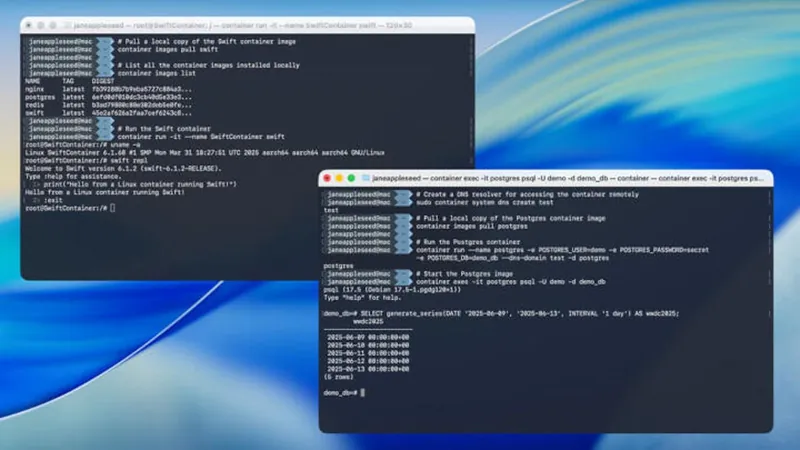
Apple Unveils Game-Changing Linux Container Framework for Macs
2025-06-13
Author: Sophie
Apple Takes a Bold Step for Linux Developers
At the recent 2025 Worldwide Developers Conference, amid a flurry of announcements, Apple quietly introduced a groundbreaking open-source containerization framework and a sleek shell tool named Container. Designed to create and manage Linux containers as lightweight virtual machines right on MacOS, this move is set to revolutionize development for Mac users.
Optimized for Apple Silicon and Future-Proofed
This innovative framework is specifically optimized for Apple Silicon and will be seamlessly integrated into the upcoming MacOS 26, codenamed Tahoe. While third-party tools like Docker and Podman have allowed users to run Linux in containers, Apple’s new offering promises a more streamlined experience.
Swift Performance and Cutting-Edge Technology
Crafted in Swift and licensed under the Apache 2.0 license, Apple Container boasts impressive sub-second start times, thanks to an optimized Linux kernel configuration paired with a minimalist root filesystem. To use this framework, a Mac with Apple Silicon, MacOS 15, and Xcode 26 beta are required.
Lightweight and Secure Containerization
Unlike conventional container solutions that operate multiple instances within a single heavy VM, Apple's framework initiates a unique lightweight VM for each container. Built on the reputable Kata Containers project, each container is provided with its own isolated Linux kernel environment, significantly boosting security and privacy.
Networking Challenges and Future Fixes
Each container can even be assigned its own dedicated IP address, enhancing network isolation and eliminating the need for port forwarding. However, if you attempt to run the Container tool on MacOS 15, be prepared for network connectivity issues, as the networking helper must initialize before the first container starts.
A Strategic Move for Developers
So why is Apple making this pivot toward Linux containerization? Clearly, there’s a growing demand among developers for robust Linux project support. By acknowledging the critical role of Linux containers in software development, Apple is providing Mac users with a high-performance, secure platform for their projects—much like what Microsoft achieved with its Windows Subsystem for Linux.
Setting the Stage for MacOS as a Development Powerhouse
In essence, Apple's launch of this open-source tool solidifies MacOS as a premium development platform tailored for container-based workflows, marking a pivotal moment for Mac users in the tech community.









 Brasil (PT)
Brasil (PT)
 Canada (EN)
Canada (EN)
 Chile (ES)
Chile (ES)
 Česko (CS)
Česko (CS)
 대한민국 (KO)
대한민국 (KO)
 España (ES)
España (ES)
 France (FR)
France (FR)
 Hong Kong (EN)
Hong Kong (EN)
 Italia (IT)
Italia (IT)
 日本 (JA)
日本 (JA)
 Magyarország (HU)
Magyarország (HU)
 Norge (NO)
Norge (NO)
 Polska (PL)
Polska (PL)
 Schweiz (DE)
Schweiz (DE)
 Singapore (EN)
Singapore (EN)
 Sverige (SV)
Sverige (SV)
 Suomi (FI)
Suomi (FI)
 Türkiye (TR)
Türkiye (TR)
 الإمارات العربية المتحدة (AR)
الإمارات العربية المتحدة (AR)